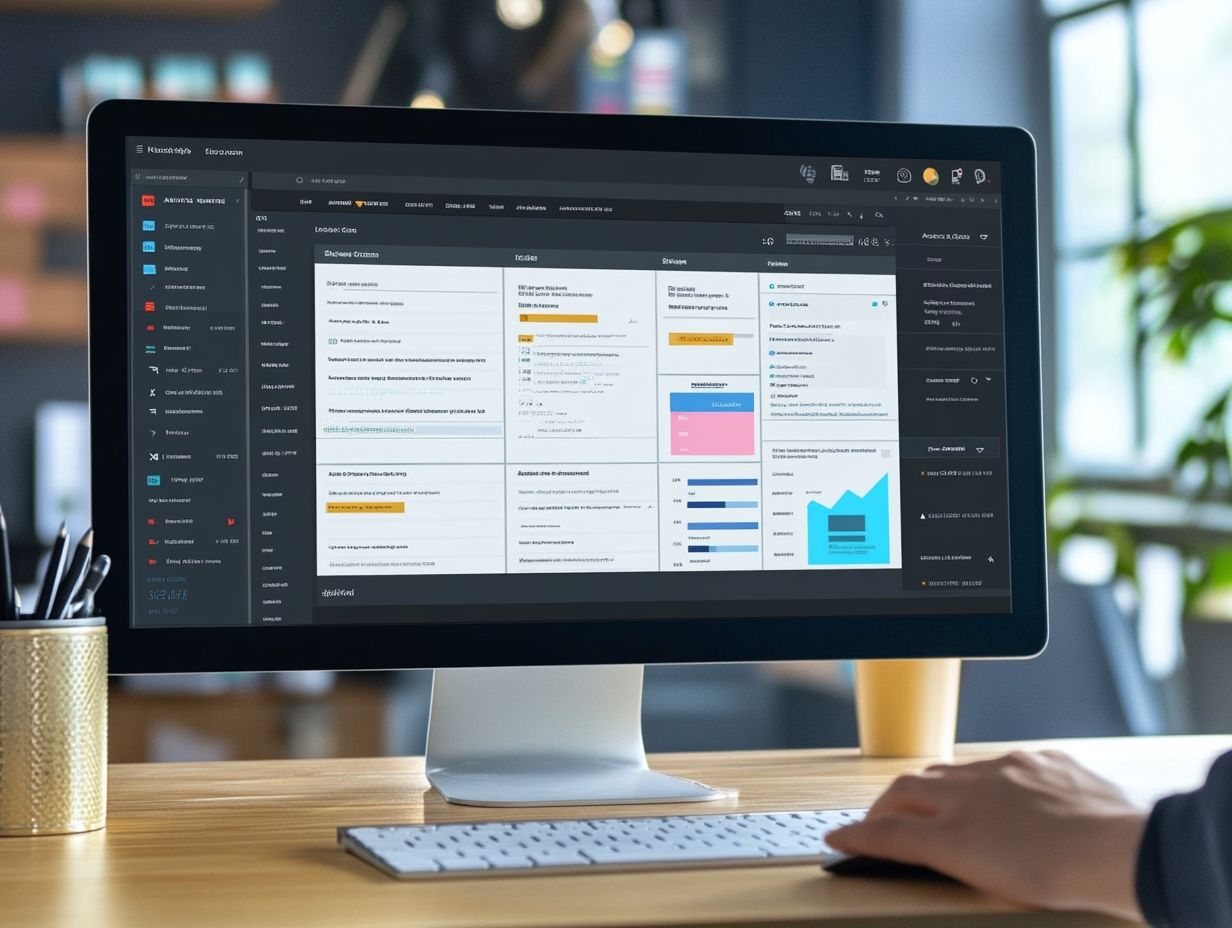How to Use CRM for Email Marketing?
In today s competitive landscape, mastering effective communication with your customers is essential for achieving business success.
This article explores how CRM and email marketing work together. You ll learn what CRM and email marketing are, along with their myriad benefits. We ll guide you through the seamless integration process, ensuring you make the most of both worlds.
Explore best practices for segmenting your audience, crafting captivating content, and using CRM data to personalize your outreach. The discussion will also cover how to measure success and refine your strategies to deliver maximum impact.
Get ready to supercharge your marketing strategy!
Contents
- Key Takeaways:
- Unlocking the Power of CRM and Email Marketing
- Benefits of Using CRM for Email Marketing
- Integrating CRM with Email Marketing
- Best Practices for Email Marketing with CRM
- Measuring Success with CRM and Email Marketing
- Adjusting Strategies for Optimal Results
- Frequently Asked Questions
- What is CRM and how does it relate to email marketing?
- Why should I use CRM for email marketing?
- How do I integrate my CRM with my email marketing platform?
- What types of data can I collect and use in my email marketing efforts through CRM?
- Can I automate my email marketing efforts using CRM?
- How can I measure the success of my email marketing campaigns through CRM?
Key Takeaways:

- Unlock the power of customer data by integrating CRM with email marketing, leading to improved segmentation and personalization.
- Increase efficiency and maximize results through automation when using CRM for email marketing.
- Utilize CRM data to create engaging, relevant content and track key metrics for success.
- Choose the right platforms and integrate workflows for optimal results.
Unlocking the Power of CRM and Email Marketing
Understanding the intricate relationship between a system that helps businesses manage customer relationships (CRM) and email marketing is essential for anyone looking to elevate their customer relationships and use CRM for lead generation to optimize their sales pipeline.
A robust CRM system does more than just manage contacts; it acts as the backbone for executing email marketing strategies that enhance engagement and boost campaign performance through advanced automation and targeted messaging.
By integrating these two powerful tools, you open the door to personalized campaigns that not only nurture leads but also deliver measurable results.
Defining CRM and Email Marketing
CRM encompasses the technologies and strategies you employ to manage interactions with both potential and existing customers. Additionally, learning how to use CRM to improve customer experience can enhance your approach. Email marketing, on the other hand, stands as a powerful tool for delivering personalized messages to those customers. Together, these two elements form the backbone of your customer-centric business strategies.
CRM systems like Salesmate and HubSpot not only streamline your customer data management but also provide invaluable insights into customer behavior and preferences, allowing you to tailor your marketing efforts with precision.
Email marketing enhances this approach by enabling you to send targeted campaigns, newsletters, or promotions based on the data you’ve gathered. This, in turn, boosts engagement and fosters loyalty.
For example, you might use HubSpot s CRM to segment your audience effectively and then launch personalized email campaigns that resonate with each group, ultimately driving sales and improving customer satisfaction.
Benefits of Using CRM for Email Marketing
A CRM enhances your email marketing efforts, improving your outreach and campaign results.
Imagine crafting personalized campaigns tailored to customer data, expertly segmented marketing lists, and the ability to track engagement metrics this is where CRM shines.
You can create email sequences that truly resonate with your audience. Plus, by integrating email automation into your CRM, you streamline your automation journey, making the entire process not only more efficient but also user-friendly.
Improved Customer Segmentation and Personalization
Improved customer segmentation stands out as one of the most significant advantages of utilizing CRM for email marketing, enabling you to craft targeted emails tailored to specific audience segments.
By leveraging the sophisticated tagging and filtering features within your CRM system, you can effortlessly categorize customers based on various criteria like purchase history, engagement levels, and demographic details.
For example, if you run a retail company, you might tag customers who frequently buy summer clothing. This allows you to send them tailored promotions during the warmer months.
Such strategic segmentation not only enhances the relevance of your communications but also significantly boosts engagement metrics. Recipients are far more likely to open and interact with content that resonates with their specific interests and past behaviors.
Ultimately, this approach leads to higher conversion rates and fosters improved customer loyalty.
Increased Efficiency and Automation

Boosting efficiency in your email marketing efforts is achievable through the integration of email automation with your Customer Relationship Management (CRM) system. Learning how to use CRM for social media management can enhance this integration, allowing you to send automated emails that nurture leads along the sales pipeline effortlessly.
This strategic approach saves you valuable time while amplifying your marketing campaigns’ effectiveness. Timely communication with potential customers ensures consistent engagement, eliminating missed opportunities often caused by manual errors or delays.
With streamlined processes, your marketing efforts become more targeted and relevant, leading to a superior customer experience. Imagine boosting your conversion rates significantly as clients receive the information they need exactly when they need it, fostering trust and loyalty to your brand.
Integrating CRM with Email Marketing
Integrating your CRM with email marketing platforms is crucial for maximizing customer data potential and crafting impactful email campaigns, especially when you know how to use CRM for event management.
This integration allows data to sync seamlessly between systems, streamlining your management of marketing lists and enhancing customer engagement through targeted email broadcasts.
Choosing the Right CRM and Email Marketing Platforms
Selecting the right CRM and email marketing platforms is essential for implementing effective email marketing strategies that drive results. Learning how to use CRM for lead generation can simplify communication, strengthen customer relationships, and elevate your campaign performance.
When assessing options like Salesmate, HubSpot, ActiveCampaign, and EngageBay, keep the following key criteria in mind:
- User experience is paramount; a smooth interface greatly influences your team’s adoption and utilization of the tool.
- Integration capabilities are equally important; platforms that seamlessly connect with other tools enhance workflow automation and ensure data consistency.
- Don t overlook cost-efficiency. Maximizing your ROI while accessing necessary features is vital in today’s competitive marketing landscape.
Syncing Data and Integrating Workflows
Syncing data between your CRM and email marketing software is essential for crafting a cohesive marketing strategy that enables targeted communications and efficient workflows.
By keeping customer information consistently updated across platforms, you can leverage valuable insights to create personalized campaigns that resonate with your audience.
This integration eliminates tedious manual data entry, freeing up precious time for your marketing team and significantly enhancing your targeting accuracy.
When automating workflows, tasks like lead nurturing and follow-up communications become streamlined, allowing you to respond swiftly to customer interactions.
The result? An uplift in operational efficiency and a substantial boost in email marketing effectiveness, leading to improved engagement and higher conversion rates.
Best Practices for Email Marketing with CRM
Implementing best practices for email marketing alongside CRM in digital marketing will transform your campaigns immediately while enriching the overall customer experience.
By leveraging these tools thoughtfully, you position yourself to engage your audience more meaningfully and drive greater results.
Start integrating your CRM with email marketing today for immediate benefits!
Segmenting Your Email List

Segmenting your email list is a powerful strategy that allows you to send targeted emails based on customer data and preferences. This leads to significantly higher engagement rates.
By using labels and categories within your CRM (Customer Relationship Management), you can categorize your audience more effectively. For example, creating segments based on past purchase behavior or specific interests enables you to craft tailored messaging that truly resonates with each group.
Consider a brand that sells fitness gear. Instead of blasting a one-size-fits-all promotion, they could specifically target avid runners with exclusive deals on running shoes. Meanwhile, they can offer yoga enthusiasts discounts on mats and apparel.
This precision not only boosts your email open rates but also builds strong loyalty among your customers, as subscribers feel understood and valued.
In the end, effective segmentation transforms generic marketing into personalized communication that drives sales and strengthens relationships.
Creating Engaging and Relevant Content
Creating engaging and relevant content is essential for any successful email marketing campaign. It directly influences customer satisfaction and enhances the overall user experience.
To achieve this, you can employ a variety of strategies that elevate the appeal of your emails. One effective method is to utilize email templates, which streamline the design process while maintaining a consistent look and feel throughout your communications.
Personalization is key. By tailoring your messages to align with each recipient’s preferences and behaviors, you can make customers feel valued and understood. Addressing specific customer needs fosters a deeper connection and encourages meaningful engagement.
Ultimately, well-crafted content can significantly elevate your open and click rates, resulting in higher conversion and retention rates.
Utilizing CRM Data for Personalization
Using CRM data for personalization in your email campaigns can dramatically enhance customer experience and cultivate stronger relationships, especially when you explore how to use CRM for event management.
By analyzing customer purchase history, preferences, and engagement patterns, you can tailor your messages to resonate more deeply with each individual. Imagine sending targeted recommendations that reflect a customer’s previous purchases or browsing behavior. This approach can significantly elevate both open and conversion rates.
Take a cue from a well-known clothing retailer that effectively implemented this strategy. They sent personalized emails featuring items related to past purchases, resulting in a remarkable 20% boost in sales.
Segmenting your audience based on demographics, such as age or location, allows you to deliver more relevant content. This way, your emails feel less like mass communications and more like bespoke offers crafted specifically for each recipient.
Measuring Success with CRM and Email Marketing
Measuring success in email marketing through your CRM requires tracking key performance and engagement metrics. These insights illuminate your campaign’s effectiveness and enhance your understanding of customer interactions.
Key Metrics to Track
Tracking key metrics is crucial for evaluating the effectiveness of your email marketing campaigns. It helps you make informed adjustments to elevate performance.
By closely monitoring open rates, you can assess how compelling your subject lines are and whether they resonate with your target audience. Click rates reveal the level of engagement and interest in your content, indicating whether your call-to-action is hitting the mark.
Conversion rates reflect how many recipients completed the desired actions, making them vital for measuring actual success and return on investment. Subscriber growth metrics help you gauge how your audience is expanding and the overall vitality of your email list.
Understanding the relationships between these metrics provides you with valuable insights that can directly shape your strategy and enhance user engagement.
Act now to track these key metrics and elevate your email marketing game!
Adjusting Strategies for Optimal Results

Act now! Adjust your strategies based on real-time data for the best results in your email campaigns while ensuring a positive customer experience.
By closely monitoring open rates, click-through rates, and conversion metrics, you can discover what resonates with your audience and what doesn t.
Utilizing A/B testing comparing two versions of an email to see which one performs better provides valuable insights that lead to more effective strategies.
Incorporating feedback loops, where customers can share their preferences, sharpens your targeting and content.
Segmenting your audience based on behavior and demographics lets you craft tailored messaging that significantly boosts engagement.
Continuous analysis of these metrics keeps your strategies aligned with customer expectations, building stronger relationships and encouraging repeat business.
Frequently Asked Questions
What is CRM and how does it relate to email marketing?
CRM stands for Customer Relationship Management. It is a software that helps businesses manage interactions with current and potential customers. It relates to email marketing by allowing businesses to store and analyze customer data, personalize email campaigns, and track customer engagement.
Why should I use CRM for email marketing?
Using CRM for email marketing helps create more targeted and personalized campaigns, leading to better engagement and higher conversion rates. Additionally, utilizing CRM for better marketing campaigns enables you to track and analyze customer data to improve your marketing strategies.
How do I integrate my CRM with my email marketing platform?
Most CRM software and email marketing platforms offer integrations for seamless connection. Look for this option in the settings or integrations section of both platforms and follow the prompts to connect them.
What types of data can I collect and use in my email marketing efforts through CRM?
You can collect and utilize various data points such as customer demographics, purchase history, browsing behavior, email engagement, and more. This data helps you segment your audience and create targeted, personalized email campaigns.
Can I automate my email marketing efforts using CRM?
Yes, you can set up automated email campaigns using CRM. Create triggers based on actions or behaviors, such as abandoned carts or website visits, and have emails automatically sent to customers.
How can I measure the success of my email marketing campaigns through CRM?
CRM allows you to track and analyze important metrics like open rates, click-through rates, conversion rates, and more. You can also use A/B testing to identify which email campaigns are most effective. This data helps you make adjustments and enhance your email marketing strategies.






